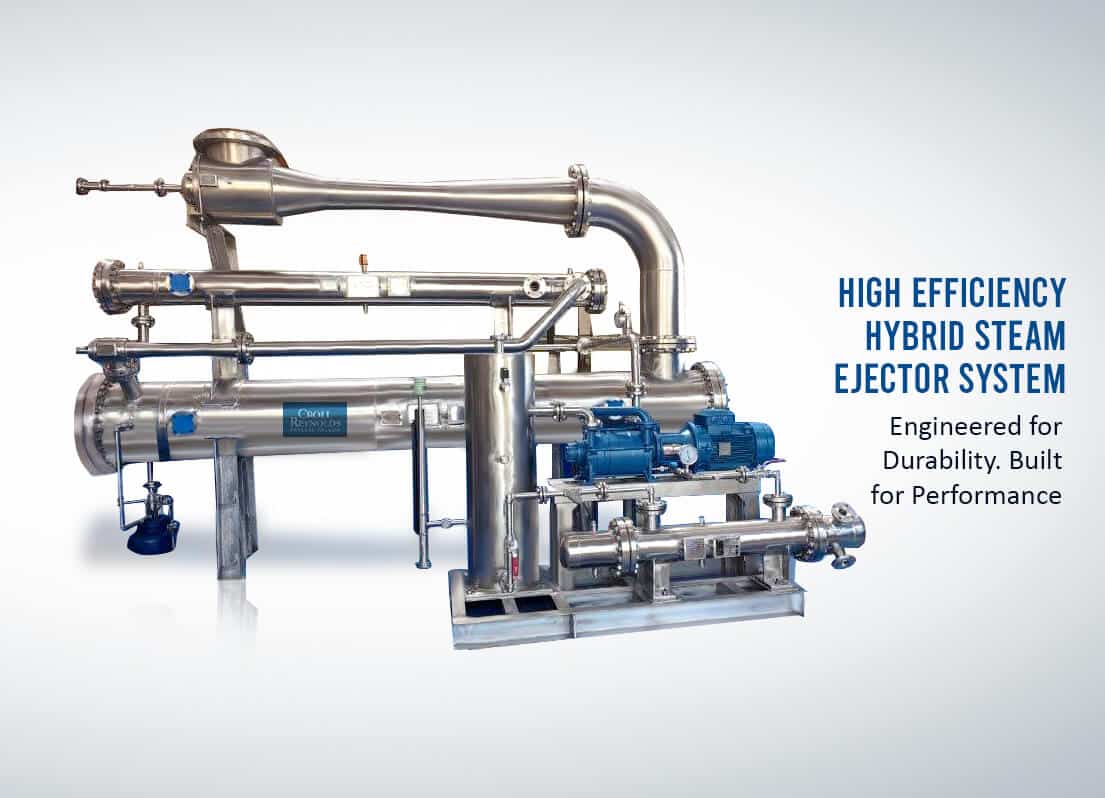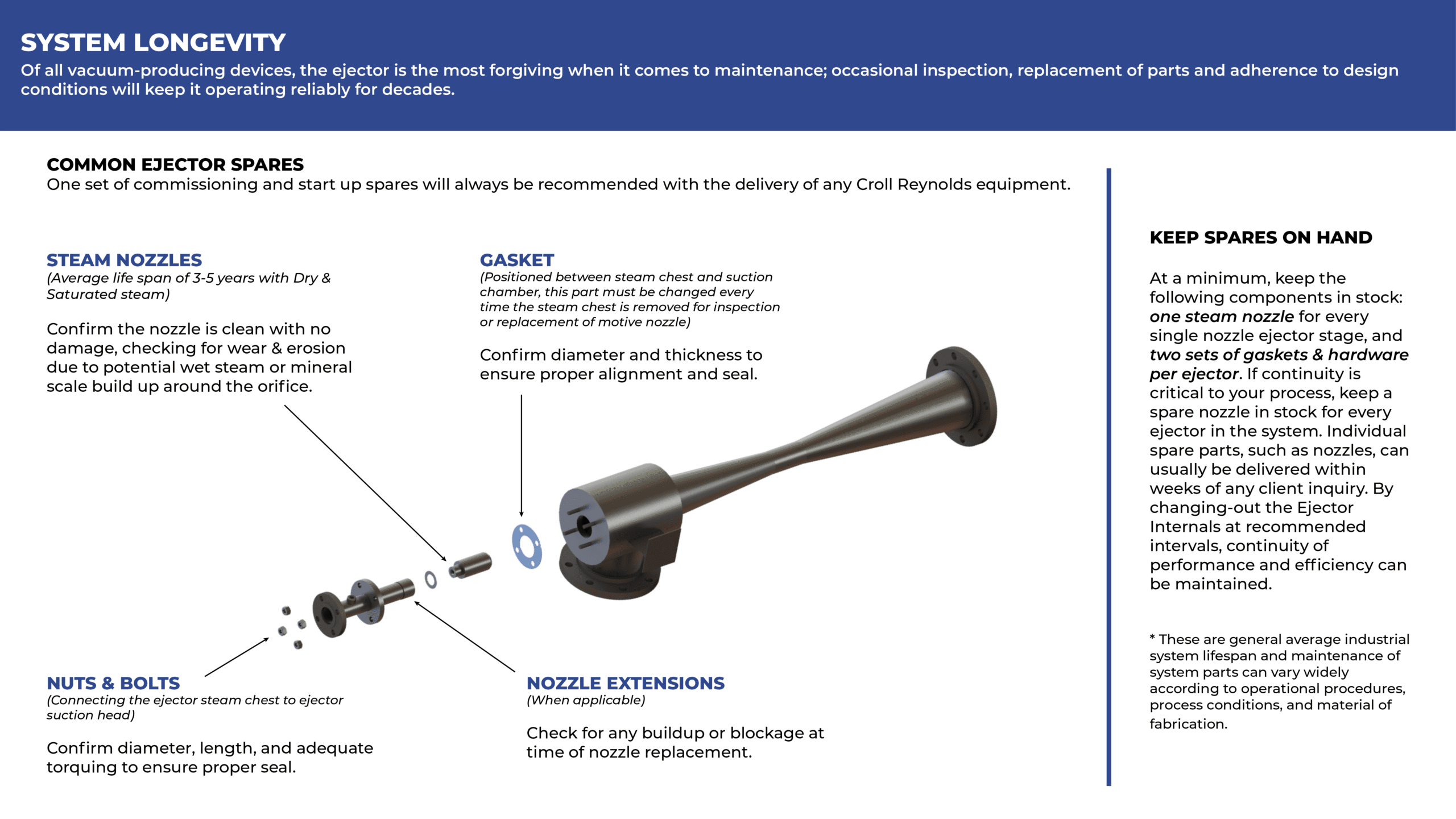Reducing the consumption of resources and increasing system performance are top priorities in sectors where vacuum processing equipment is essential to operations. In contrast to conventional steam ejector vacuum systems, hybrid ejector vacuum systems have shown to be a very efficient option. Energy consumption, functional dependability, and process efficiency are all greatly increased by these hybrid systems, which combine liquid-ring pumps with multi-stage ejector equipment.
Learning the Hybrid Ejector Vacuum Operation
A hybrid vacuum system offers a significant improvement over a typical steam ejector vacuum system while still carrying out the same fundamental task. One- or two-stage liquid-ring vacuum pumps are included into hybrid systems to replace the need for steam at final stages removed. These liquid ring pump packages, downstream of ejector systems, essentially take the role of a portion of multi-stage ejector system’s by replacing a single or two stage(s) of ejector along with inter/after condenser.
Rotating pumps with positive displacement known as liquid-ring vacuum pumps generate vacuum by using a sealing liquid, usually water or an appropriate seal fluid. In contrast to a conventional configuration that uses a lot of steam resources, hybrid systems use electricity to power the liquid-ring pumps. In many situations, this design completely does away with the requirement for high-pressure boilers while also lowering total steam use.
Increasing the Flexibility of the Process
Versatility is one of the best qualities of hybrid vacuum processing equipment. Hybrid systems eliminate the need for complex filter separators or traps by managing a variety of gases, vapors, particles, and pollutants. Without regular maintenance interruptions, a hybrid system maintains consistent vacuum levels even when handling hostile chemical vapors or large particle loads.
Three different operating modes—once-through, partial ventilation, or complete recirculation—can be set up for liquid-ring vacuum pumps based on the particular needs of the process. Because of its flexible configuration, each hybrid system may be precisely customized to fit its intended use, increasing process stability and efficiency even further.
Primary Benefits of Hybrid Systems
Practicality and impact are the main benefits of switching to hybrid ejector vacuum systems from traditional multi-stage steam ejector vacuum systems.
First and foremost, one significant advantage is lower utility usage. Lower-pressure steam is used in hybrid systems, which use electrical energy to replace a large portion of the thermal energy needed. Over time, this change significantly reduces operating expenses.
Operating with lower-pressure steam without sacrificing vacuum performance is another important benefit. Deeper vacuum stages may operate well with the inclusion of a liquid-ring pump, which also keeps system performance steady even in the face of difficult process circumstances.
Additionally, hybrid ejector vacuum systems are easier to maintain and repair since they may frequently be positioned at ground level. This placement at ground level lowers overall lifespan costs and structural difficulty.
Economic Advantages and Sustainability
Sustainability has become an essential operational need in today’s corporate world. With the right configuration, hybrid ejector vacuum systems with partial/full recirculation systems save sealant liquid and steam usage, which directly contributes to environmental stewardship.
Hybrid systems reduce greenhouse gas emissions and their operational footprint by working more efficiently overall and using fewer high-pressure steam boilers. Hybrid ejector equipment is an attractive investment for businesses looking to conform to environmental objectives.
Additionally, hybrid designs provide increased dependability and less wear and tear by substituting electrically powered systems for conventional steam-intensive sections. Reducing the frequency of interventions in potentially dangerous areas not only increases uptime but also makes plant operations safer.
Why Should Your Facility Use Hybrid Systems?
Achieving optimal performance and operational economy requires careful selection of vacuum processing equipment. From chemical processing to power generation and beyond, hybrid ejector vacuum systems are a great option because they provide a clever blend of conventional dependability with contemporary efficiency.
Businesses seeking to update their vacuum systems will discover that hybrid designs provide a straightforward route to increasing process effectiveness and cutting resource usage at the same time. Hybrid systems are a future-ready option that satisfies the changing needs of industrial operations thanks to their adaptable designs and reliable functioning under a variety of process events.


